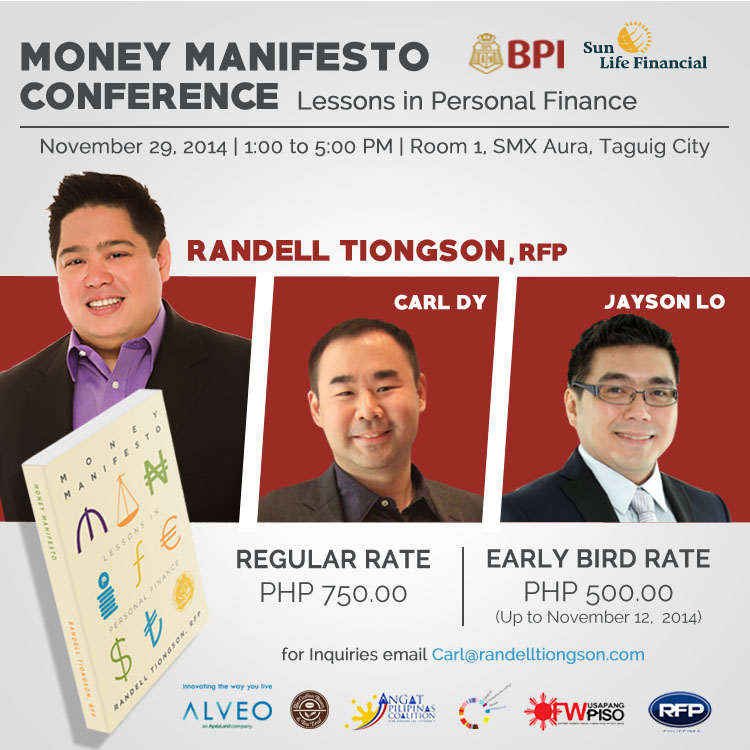When the stock market takes a dive, what should you do?
By Randell Tiongson on August 25th, 2015
The Philippine Stock Market took a heavy beating yesterday, August 24, 2015 due to external factors. The fundamentals of the Philippine market has not changed but the bearish sentiments since March has made many investors jittery, to say the least. Last Friday’s major decline in the U.S. markets had a domino effect in the whole world, coupled by issues in China.
The result? The Philippine Stock Exchange Index (PSEi) drops by 487.97 points or a retraction of 6.70% to 6,791.01 in just one day.
I recently started a MoneyTalks Viber group and quite a number of people have been active in that group because of the stock market decline. It’s nice to see that there are a lot of people who are learning much from the interactions with the experts and with each other. If you want to be part of this very active group, send your Viber number to my assistant, [email protected]
While I will never downplay what has happened yesterday, I wish to remind many that the stock market is the way it was because that is it’s nature. It is said that the stock market can be overly optimistic or severely pessimistic and the later was what has been prevailing lately and especially yesterday. The stock market cannot defy gravity – what goes up most ultimately come down… but what goes down will also go up eventually. Despite the fears, I still believe that the stock market is a great way to grow your money but you must understand that it pays to think long-term when it comes to this kind of investing. This hold true whether you are buying individual stocks or investing through equity pooled funds (Mutual fund, UITF, VUL).
If you look at the how the stock market has behaved in one month, it really will scare you.
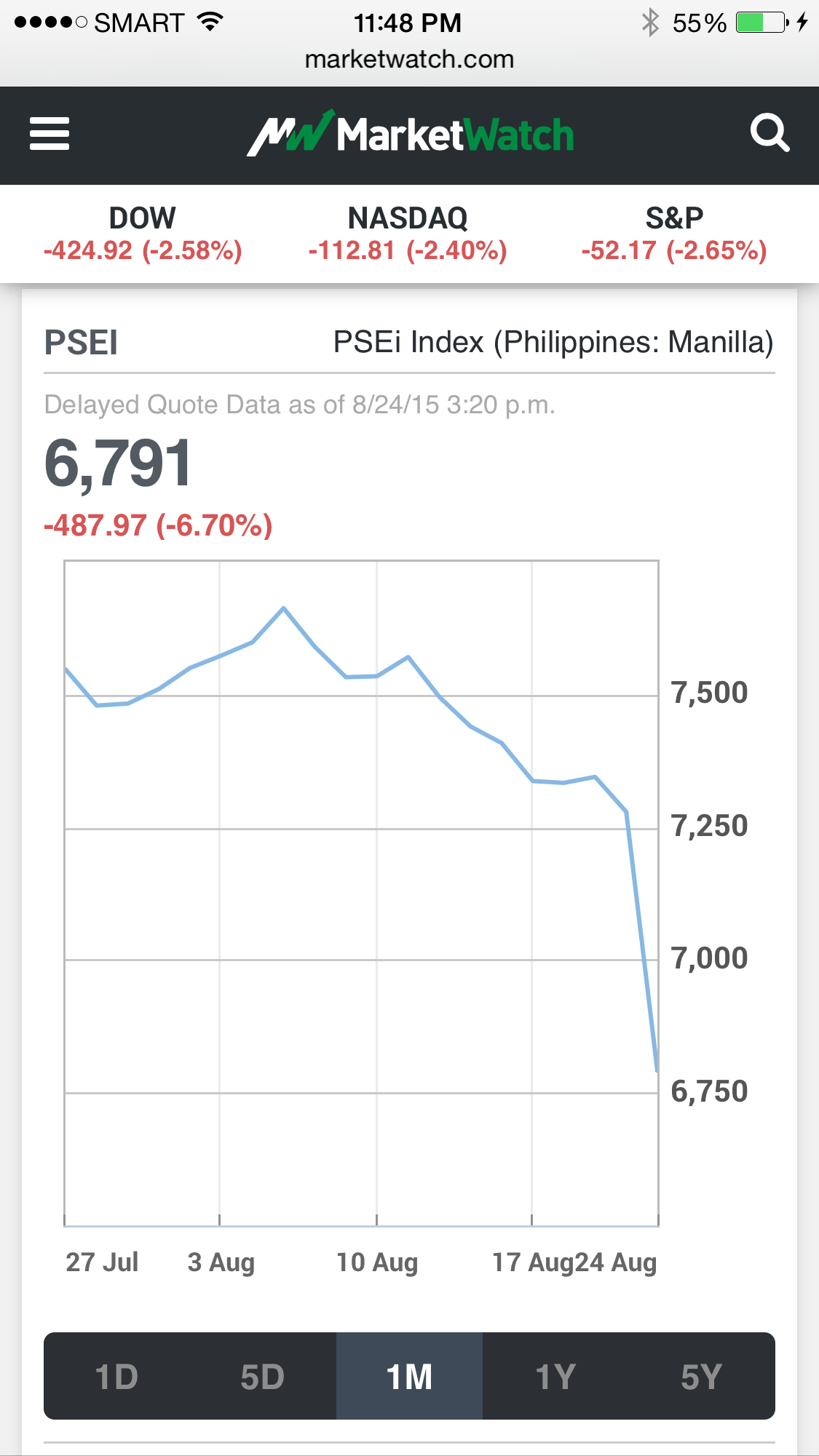
However, if you view the stock market from a long-term perspective, you will see a different picture.
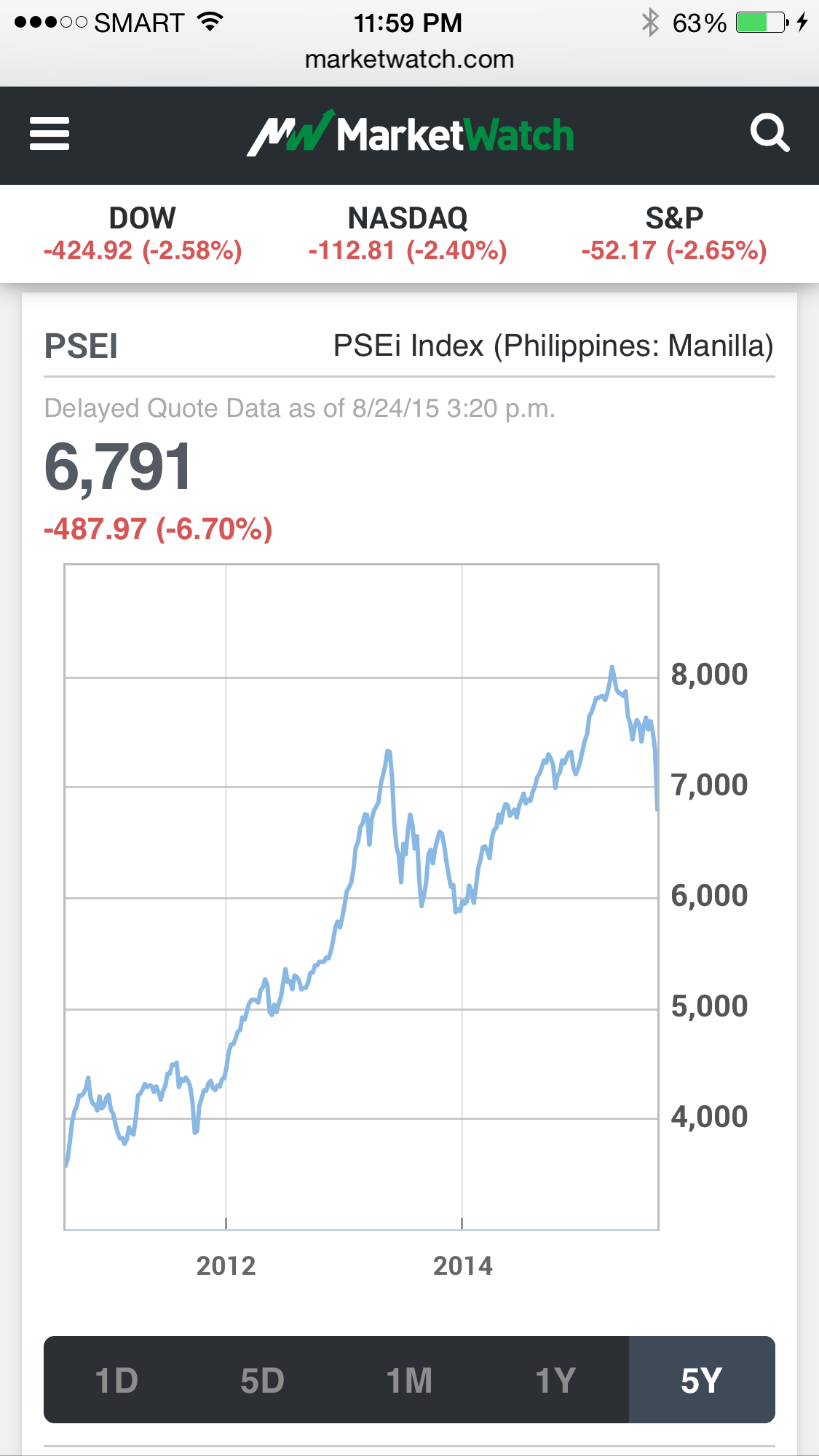
I have asked my stock market expert friends of their advise to investors with regard to what’s happening in the market recently. You will find their advices insightful, helpful although they can have conflicting opinions.
“Today wasn’t a mere correction, it was more like major psychological and technical breakdown by the market. We advise investors not to catch a falling knife and to allow the market to signal an intermediate bottom first. Looking at the peso-dollar rate vs. this 7% one-day historical drop by the PSEi, we are not convinced that this is a structural exit away from PHL assets. Most likely we just had to adjust to regional peers which have come down much against us but had more modest corrections today.” – Tony Herbosa, Chairman of Philstocks and founder of Traders Apprentice Pilipinas (TAP)
Investors should understand that markets do not go up on a straight line and market declines happen. But it is during these drops when better opportunities are presented. For as long as you do not lose sight of the big picture of why you invest, there is nothing to worry about and continue with your investing journey to be financial free. Investing during these times is not just for the brave– it is for everyone. – Marvin Fausto, President of IFE Management Advisers Inc. & former Chief Investment Officer of BDO Universal Bank
While the severe drop in global stocks show critical issues and concerns on valuation, it is the pervasive negative sentiment that makes things worse. Times like these represent opportunities to take positions in companies that present good value, more so given the lower prices. The important thing to consider is one’s investment horizon, and staying power is key amidst the volatility. – Rex Mendoza, President of Rampver Financials and former CEO of Philamlife
Everyone should treat this market situation as like a major earthquake happening. A strong earthquake will have repercussions that take time. Those who are inside should not insist on going out in panic. Those outside should not go in. There will be aftershocks. Those inside should treat their stocks for the long term. Let the dusts settle before making any decision. –Dr. Alvin Ang, PhD, economist of Ateneo de Manila
The drop is an effect of price movement due to what’s happening globally. If you look at it, the rest of Asia and most of the developed world is down. When you look at the fundamentals of our country I don’t think locally there’s anything compelling that should be a cause of alarm. However, given that we are trading and investing in stocks. There’s such a thing as expensive and a bear market. Our fundamentals are good but we are still expensive which would cause buyers to want to wait out until we become cheaper. Our fundamentals are good but we have been in a downtrend since April and will continue to do so until proven otherwise. My suggestion is for each investor to follow their buy/sell plan. It would be great though if they could wait to see until selling subsides and forms a support before they buy. It’s great to buy cheaper but not when everyone else is selling. – Marvin Germo, stock market investing advocate and best-selling author.
Always invest according to your investment objective, time frame and they must be consistent with your risk tolerance. The stock market is not for the faint of heart but we should also not be afraid of stock investing. Learn as much as you can about stock investing and always invest according to the 3 factors I mentioned and don’t forget to diversify and you should be fine.
iCon2015: The biggest investment event of the year!
By Randell Tiongson on May 4th, 2015
It’s back! The biggest finance & investment event of the year — iCon2015!
Our annual conference will be this May 30, 2015 at the SMX in Mall of Asia. Joining me in this empowering conference for this year are:

Marvin Germo – one of the most sought after stock market experts and will talk about stress-free investing in the stock market. Marvin is the author of 2 best-selling books on stock market investing and one of the most visible investment advocates.
Mike Manuel – the Chief Investment Officer of Sun Life in Asia. Mike is an accomplished fund manager for over 2 decades and his team manages one of the largest funds investment funds in the country. He will be speaking on growing trends in investments and how to properly invest for the future.
Efren Ll. Cruz – one of the fore runners of the financial advocacy in the Philippines and has 3 decades of experience in the various facets of investment and financial industry. He is a best-selling author, columnist and one of the most in demand finance trainers in the country. Efren will give us a presentation on investment management.
Chinkee Tan – Mr. Chink+ and the wealth coach of the masses! He is ann award wining media practitioner, best seller of multiple books and one of the most active personalities that encourages Filipinos to be financially empowered. Chinkee will give a talk on the value of entrepreneurship in growing your wealth.
Francis J. Kong – the country’s number one motivational speaker, multi-award winning media practitioner, best-selling author of over 10 books and truly an inspiring coach. Francis will give a powerful and life-changing talk on “beyond investing”.
Aside from our powerful platform speakers, we will have a special session during the lunch break with Dr. Alvin Ang, PhD on the impact of the ASEAN integration on investing and Jess Uy on growing trends on global investing.
I will be speaking on balancing finances and investments and will do an overview of growing trends that will affect investing.
iCon 2015, just like the earlier previous conferences is not only power-pack, informative and insightful, it is also empowering!
For inquiries, please click HERE or send a message to [email protected] or 0917-8482974
Investing in good and bad times
By Randell Tiongson on November 20th, 2014

To a great degree, investments are generally affected by economic cycles. You always hear people encouraging you to make investments because the economy is good. You also hear businessmen complain a lot when the economy is bad. The economy goes through changes from time to time which we normally refer to as economic cycles.
Economic cycles are fluctuations in the economy between periods of expansion or growth and contraction or recession. Factors that determine cycles are usually Gross Domestic Product (GDP), interest rates, employment numbers, consumer spending and the like. Investopedia further explains: “An economy is deemed to be in the expansion stage of the economic cycle when gross domestic product (GDP) is rapidly increasing. During times of expansion, investors seek to purchase companies in technology, capital goods and basic energy. During times of contraction, investors will look to purchase companies such as utilities, financials and healthcare.”
People are more likely to invest their money during when the economy is in its growth cycle and they are likely to stay away from investing when the economy contracts. What should be the right investment approach during the economic cycles? Should you stop investing when the economy is down and invest when it’s growing?
Economist and finance advocate Dr. Alvin Ang’s position is as follows:
“My take on business cycles is that they are closely related to productivity growth. Sustained growth of productivity usually predicts expansion. The investment strategy during this phase should be aggressive commensurate to the growth of productivity. It’s a time for accumulation as household capacities are expanding as well. During slowdown of productivity growth, leading to Decline, investment strategy should mimic the rate of productivity slowdown. During recession productivity falls sharply. Investment becomes least priority but the strategy is to continue with an established base amount at least 10% of the rate invested at aggressive phase. This should go up commensurate to the rate of recovery.”
Seasoned stock market investors, especially the more aggressive ones like Marvin Germo may take a contrarian approach when it comes to investing in economic cycles. Stock prices usually would go down prior to any economic decline so they will start to stay away from the market even if the economy is still not yet at a decline. The stock market will usually be at it’s lowest during a recession which is a signal to investors to start accumulating good quality stocks at a bargain. I once heard a stock market expert say to ‘start selling stocks at the sound of bells and start buying at the sound of alarms’; in other words, buy when people are afraid to buy and sell when people have been buying like crazy. This approach is typical of many who have a trading strategy. Recessions to them are opportunities to make a killing in the market. Interestingly enough, many of SM’s major investments were also done during bad economic times (SM North EDSA, Mega Mall, etc.) since cost of land, labor, etc. are much cheaper. In 2013, the economy was doing really well, and yet there was a big correction in our local markets. In the short term, prices may not always be a true representation of real value. The chart below shows the performance of the PSEi in 2013:
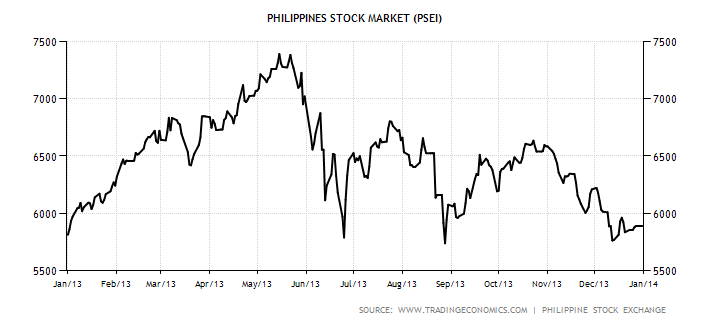
Other investments such as fixed income are also economy sensitive but not as anticipatory like stocks. When the economy is in a decline, prices of bonds normally go down and with that, yields of bonds will go up as a result. Although not as volatile as stocks, capital losses can also be experienced if you have a short-term orientation.
If you are a long-term investor and you are investing according to long-term objectives such as retirement, education funding, etc., cycles should not have an adverse effect on you. In a longer period, say 10 years and while markets will go up and down, and even experience crashes such as the 2008 crash, it is expected that markets will recover and will still go up despite volatility. For long-term investors, the issue is not so much on volatility but really on time. I often remind people that stock market investing is not just about timing, it is also about time. The general rule in investing is this: the longer, the better. The chart below shows the PSEi in a 10-year period. You can see that the market, though very volatile is on an upward trajectory in the long term:
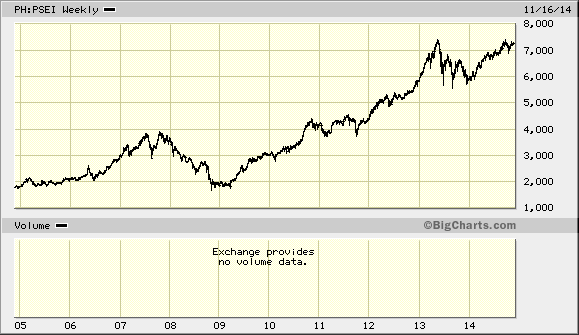
Fixed income investments (Bonds) will not have any capital loss and yields will be realized if it is held up to its maturity. Just like stocks, bonds will do well in a long period, with less volatility.
When investing, it is very important to determine your investment objectives and time frame first. It is generally a good idea to hold on to your investments up until the time you need it and if your horizon is rather long, say 10 years, you should not be too nervous every time you hear negative news about the economy. A properly diversified investment strategy should allow you to hit your objectives even with the different economic cycles if you in the long run. Opportunities are also there for the taking when economy goes down, as long you are patient enough to wait when the economy rebounds and you have the appetite to take risks.
But alas, always remember that money and investments are just tools and they are not the end goal. In God’s economy, there are no recessions.
“But lay up for yourselves treasures in heaven, where neither moth nor rust destroys and where thieves do not break in and steal.” – Matthew 6:20, ESV
Learn more investment strategies at the Money Manifesto Conference. To register, CLICK HERE.
